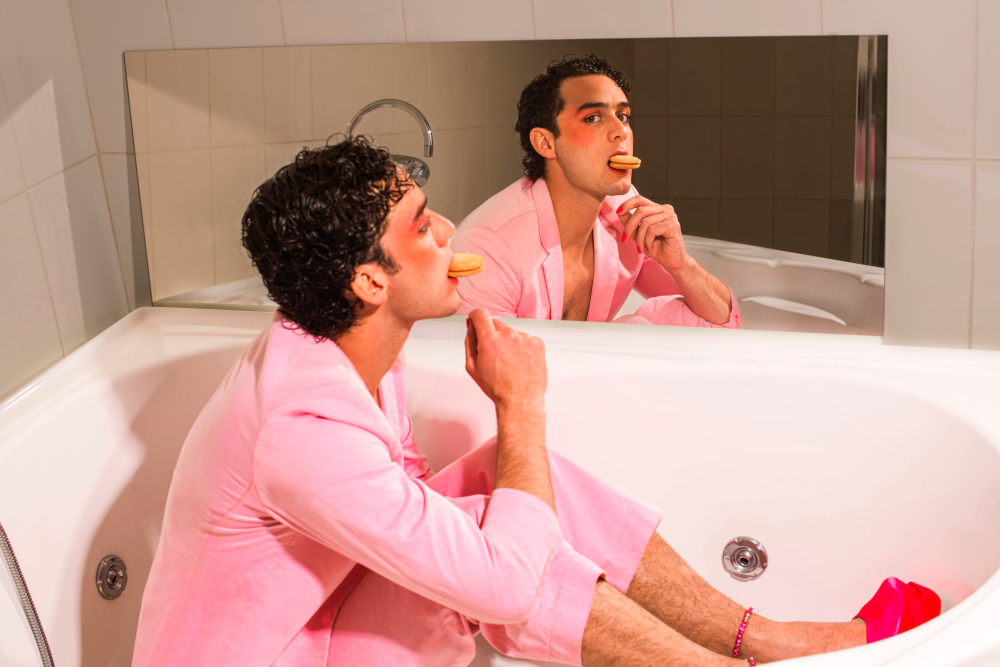Refuse, Assembly George Square Studios ★★★★
Maks works as a bin man in a small Ukrainian town. His little son might get picked on at school and told he’s smelly because of his dad’s occupation, but Maks is content with his lot, his soulmate of a wife Valentyna, his sense of connection with the community and its colourful characters, and also the feeling that he’s actually contributing something to their lives. Even to that of flirty, lonely Yelena, whose isolated house sits at the very end of his run.
There are moments early on when writer Lucy McIlgorm’s touching drama looks like it’s heading towards a tale of grubby infidelity. But despite possible temptation, it remains squeaky clean, aiming its sights at less personal, more ambitious questions – in this case, about lives shattered by invasion and war, and about intimate relationships fractured as a result.
Refuse is an undeniably powerful show, and one that successfully paints in the human stories of loss and separation behind the headlines we’re so familiar with. Ukrainian actor Vasyl Sydorko (main picture) is cheerfully bumbling in the lead role, discovering a far greater range and depth as war detonates over his home town, while his compatriot Maria Shtofa provides a compelling voice of insight and concern as Valentyna. Writer McIlgorm puts in a strong turn, too, as the increasingly needy Yelena, whose new arrival raises fundamental questions with Russian missiles raining down.
Writer McIlgorm and director Anastazie Toros find the convincing rhythms of everyday speech, and revel in the mundane intricacies of daily life in the show’s opening acts, while sketching in the trauma of conflict deftly in its closing section. If its purpose is to raise awareness, or to ensure continuing attention, then Refuse succeeds well, but there’s a sense, too, that it’s a little too black and white to offer much in the way of nuance or insight into the conflict. There’s the suggestion of a grand metaphor for Ukraine’s innocence in McIlgorm’s wide-eyed bin man simply going about his business, but it’s a parallel that could perhaps be brought out more explicitly if the show were to make a more forceful impact.
- Until 25 August
 Terry's: An American Tragedy About Cars, Customers and Selling Cars to Customers, Pleasance Courtyard ★★★
Terry's: An American Tragedy About Cars, Customers and Selling Cars to Customers, Pleasance Courtyard ★★★
Welcome to small-town Thessaloniki, USA, where the four unfortunate salespeople at Terry’s Cars and Automobiles have an almost insurmountable task to perform over Memorial Day weekend – to sell no fewer than 66 used cars in four days, in order to meet their monthly target. As desperate times require desperate measures, their efforts grow increasingly outlandish in the foursome’s compulsion to comply – or face the wrath of unseen dealership owner, Terry himself.
The inaugural Fringe show from UK/US/French acting/writing/clowning quartet BRILLIG (pictured above), Terry’s (let’s go with that shortened title) has plenty to entertain and gently prod in its softly spoken satire on the desperation behind American consumerism. There are songs, dances, cringe-inducing TV adverts, and an awful lot of even more cringe-inducing sales work. Its somewhat freewheeling form sticks relatively clearly to the demands of its initial set-up, but there’s an enjoyable freedom and unpredictability to the paths the four performers take to get there.
But Terry’s also feels in some ways like a work in progress. Songs are sometimes sung in unaccompanied unison rather than given appropriately glitzy accompaniments, and plot threads are left dangling in mid-air: whatever ultimately happens, for example, to French-born Henri’s attempt to gain US citizenship, so fraughtly discussed early in the show? Similarly, possibilities for humour are sometimes left frustratingly unexplored, and Terry’s satire would probably benefit from being just a touch more savage than it currently is. It’s a likeable, diverting hour of comedy with a message (just about), but Terry’s would be far more memorable if it dared to bare its teeth.
- Until 25 August
 Sugar, Assembly Checkpoint ★★★
Sugar, Assembly Checkpoint ★★★
"May I make contact with your lap?" purrs Tomáš Kantor (pictured above, image by Meagan Harding) conspiratorially as he prepares to straddle the legs of one unsuspecting audience member. Consent, after all, is crucial. Later he’ll ask them how much they’d pay for sex with him. Kantor admits he isn’t sure how much he should even be charging.
In writer Ro Bright’s high-camp, high-glamour, solo cabaret/musical/theatre show, Kantor is new to the sex work game. He’s transformed himself into Sugar, every older daddy’s dream twink, with the sole purpose of gathering material for – you guessed it, a solo cabaret/musical/theatre show. After mixed success on online meat markets, he hooks up with Richard, an apparently endlessly rich tech executive, for a deliciously queer spin on Pretty Woman that sees him defying preening guardians of haute couture, settling in to lavish hotels, and ultimately – maybe – making his daddy fall more seriously for his charms. Until, that is, Sugar oversteps the mark in a particularly flattering designer dress.
Kantor blazes in an all-singing, all-dancing, all-lasciviously squatting performance that brings together reworked pop, original material, flirting, keyboards, cello – it just never stops. He’s a wickedly talented, committed performer who sets out to make his audience just as uneasy as he himself felt at his first sex-work encounter – even if later episodes reveal a far softer, more vulnerable side.
But ultimately, Sugar serves as a showcase for Kantor’s talents – prodigious though they are – rather than offering any particular insights into sex work or queer relationships. Kantor’s closing homily demanding greater understanding of sex workers’ rights and plights falls rather flat when Sugar itself has done so little to encourage that understanding. And after kicking a sex-doll Richard dismissively around the set, it feels a little rich for Bright’s show to damn him for not offering Sugar the respect they’re due. Sugar is a wild ride, and a thrilling one at that, but its reluctance to dole out the same empathy and compassion it demands leaves rather an unpleasant taste in the mouth.
- Until 24 August















Add comment